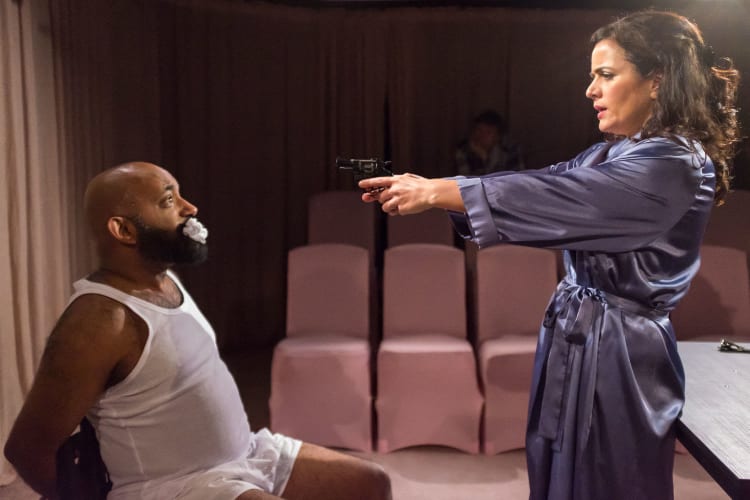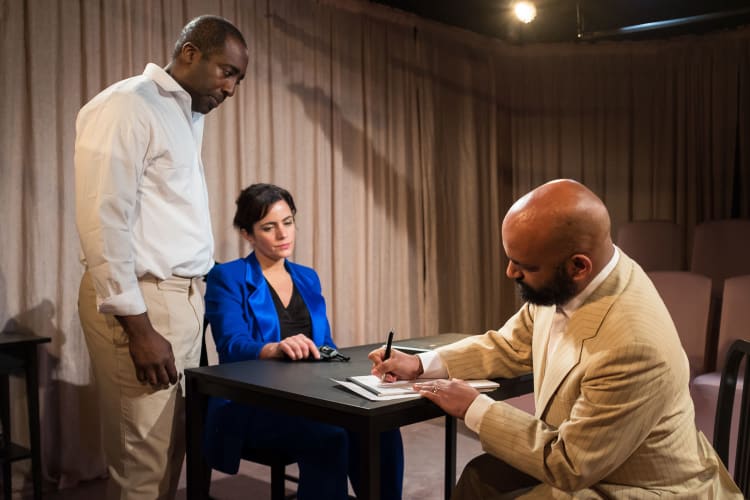Death and the Maiden is the third and final play in the autumn season of politically themed work by young Welsh companies curated by The Other Room. Following on from Debbie Tucker Green’s death-penalty drama hang and the Palestine-activism-oriented My Name Is Rachel Corrie, it is the oldest play in the series, but in many ways the most current.
By some distance the best-known work by Chilean-Argentinian author Ariel Dorfman, it was written at a time of relative global optimism. First produced in 1991 (winning the Olivier Award for Best New Play in 1992), when the Iron Curtain had just fallen, an end to apartheid was being negotiated and the first Gulf War seemed to have contained the threat posed by at least one dictator, it takes place in a new South American democracy, where peace and stability seem to have broken out.
The play is set in the home of Gerardo Salas, previously an activist and now a high-flying lawyer, about to sit on a truth and reconciliation commission—a responsibility which will do his political ambitions no harm at all. After suffering car trouble on a long journey, he has been assisted by a doctor, Roberto Miranda.
Unfortunately for both of them, however, Gerardo’s wife, Paulina, overhearing their conversation, has recognised Miranda’s voice and is immediately convinced that he is one of the functionaries within the former dictatorship who tortured and raped her when she was a political prisoner, several years earlier.
Death and the Maiden is that rare thing—a political thriller which is both profoundly political and, if not viscerally thrilling, at least extremely tense.
This is because Paulina manages to gag and bind Miranda and pull a gun on him, threatening to kill him if he does not confess his guilt. If she goes through with this, it will end Gerardo’s career and therefore possibly scupper the commission, denying justice to thousands of other victims of the old regime.
The action takes place on an austerely dreamy set designed by Amy Jane Cook—bounded by pink curtains and carpets, with black furniture (and food). Even before the action begins, Pradeep Jey’s Miranda wanders about the space, palpably haunting the nightmares of Paulina, played by Lisa Zahra.
Director Abdul Shayek has cast the play to foreground the universality of the theme—Jey has an Indian background, Zahra is visually Caucasian but with Middle Eastern heritage, Gerardo is played by Vinta Morgan, who is black. The textual references, however, situate us securely in South America, and the use of a clunky cassette recorder indicates that we are in a pre-digital era.
Regrettably, fleeting use is made of the Schubert String Quartet which gives the play its title and which soundtracked Paulina’s prison ordeals. Dan Lawrence’s soundscape alternates between the chilling (the torturous past) and the reassuring (the comfortable present); and Ciarán Cunningham’s flickery lighting design is very unsettling, redolent as it is of electrocution.
Unlike in previous productions (such as the 1994 film version, directed by Roman Polanski—a man who must have a very complicated relationship with the concept of forgiveness) we are left in little doubt as to Miranda’s guilt. His denials are aggressive rather than self-pitying and Jey plays him as a man whose confidence is only momentarily shaken and who could readily defend any actions he may or may not have taken in a court of law.
Zahra’s Paulina is coldly furious rather than hysterical or unhinged, her attire changing from housewifely nightgown to sharp blue suit as she embraces professionalism and refuses to demand audience sympathy. This is reserved for Morgan’s Gerardo, charismatic as the voice of reason, but not entirely unselfish in his actions and motivations, both past and present.
Death and the Maiden asks questions about democracy, patriotism, the rule of law, mercy and violence which ought not to be tricky. Its focus on individuals, however, rather than dry theory, induces much soul-searching.
As the piece ends, we are left feeling as uneasy as its protagonists. Little has been truly resolved, and, conscious of the realities of current politics, we are reminded that evil hides in plain sight.
This production is as potent and unsettling as the play itself.


